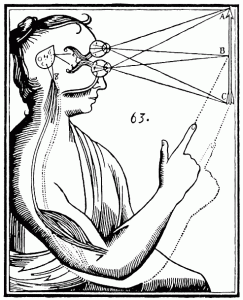Rene Descartes was a French philosopher and mathematician who established the idea that the soul exists as something immaterial and non-spatial, distinctly separate from the tangible substance of the body. In his writing, titled Discourse on the Method, he begins by establishing his first method, which would later become the foundation for the rest of his thinking. He decides to erase all assumptions of perceived reality from his mind, believing that “custom and example… persuade us, rather than any certain knowledge.” Descartes continues on to explain that we have no way of discerning if we are asleep or awake, as the very things that we see while asleep may occur without them actually being there, even though we perceive them to be real. In this way, all of what we consider our reality could be nothing but a dream. However, immediately he notes, “that while I was trying thus to think everything false, it was necessary that I, who was thinking this, was something. And observing that this true ‘I am thinking, therefore I exist’ was so firm and sure… I decided that I could accept it without scruple.” The words I think, therefor I am, is the originating thought that leads into a concept called Dualism. This is the argument that mental phenomena is non-physical and thus the mind and body, which is physically represented, are clearly distinct and separate entities. Descartes makes clear separations between the souls of living things so as not to confuse his theory. He establishes that there is a perceptive soul belonging to both animals and humans that has the capacity to experience pain, pleasure and desire, however only humans have the capacity to reason.

Descartes observes that the soul must be specially created, and not derived in any way from the potentiality of matter. He states that, “I knew I was a substance whose whole essence or nature is simply to think, and which does not require any place, or depend on any material thing, in order to exist. Accordingly this ‘I’ – that is, the soul by which I am – is entirely distinct from the body… and would not fail to be whatever it is, even if the body did not exist.” This reminded my of the article we read entitled Death With Dignity by Sharon Kaufman that discussed the purgatory like state of comatose patients. The bodies were incapable of self regulating, but machines kept them in a state that could be considered bodily life. They were still alive while only having the capacity of one portion of this dichotomy. While the experience of the comatose person could never be revealed or understood externally it is fair to say that this state is a sort of living dead, a body existing without a soul. This made me begin to question, where does the mind go in these living-but-unusable bodies? Descartes provides no answer for what may happen to the mind after the body has been destroyed. Only that, “our soul is of a nature entirely independent of the body, and consequently… it is not bound to die with it. And since we cannot see any other causes which destroy the soul, we are naturally led to conclude that it is immortal.”
His lack of an explanation as to what happens to the soul after it leaves the body may be explained by the presence of established religious doctrines of the time that this theory would have undermined. Descartes was of the mind that in order to succeed most fully with his work, he should live unobtrusively and abide by the laws defined by whichever country he was residing in. Instead of enticing the anger of the church, Descartes instead kept his focus on the distinction of the two entities of mind and body. In this itself the idea of Dualism indirectly favors immortality, and the potential survival of death.

Descartes also argues that the human senses are deeply unreliable, stating that, “the sense of sight gives us no less assurance of the reality of its objects than do the senses of smell and hearing.” This draws to question the nature of reality, a thought I found interesting in consideration of Immortality. If there is truly no “real” world or tangible body, then it could be argued that existence can be lived solely in the mind. In this sense, the self’s body and physical environment, conjured by the mind, may be as immortal as the mind itself, for so long as it exists so too will the space it fills.
See Also: https://www.youtube.com/watch?v=CAjWUrwvxs4
Descartes, Rene. The Philosophical Writings of Descartes. Vol. 1. New York: Cambridge U, 2009. Print.
Recent Comments